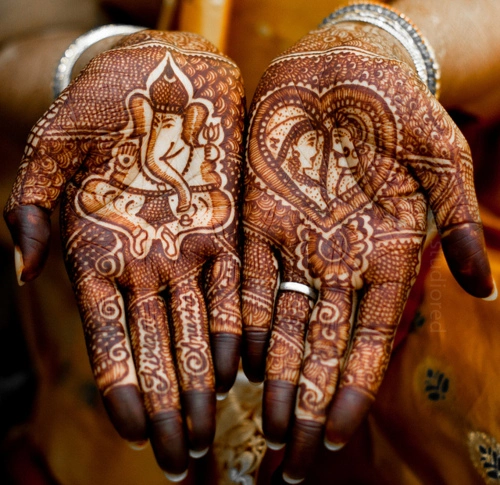I was prompted to write this because, as a self-identified pro-intersectional vegan, I couldn’t find any articles that were easily accessible and addressed this specific issue.
It’s unfortunate that vegans of colour do need to write new content to address the same types of issues, but it’s still necessary when people have a hard time understanding and considering why some things are problematic.
Many thanks to my colleague, Sonia Aujla-Bhullar, for her helpful feedback and suggestions on this article.
(Image Credit: RAJA RANI Bridal Mehndi Design)
The dangers of cultural appropriation have been discussed in detail over and over and over again, but festival-goers in North America still remain genuinely confused and defensive about using non-Western cultures as they see fit.
Due to this abundance of existing literature on the topic (just replace “bindi” or “yoga” with “henna”), I did not think it was necessary to explain why white artists shouldn’t be practising or selling Mehndi, at VegFests and other Western festivals, yet here we are.
In particular, vegans seem generally resistant to give up their attachments to Eastern traditions, citing their veganism as morally aligned with deeply spiritual aspects of these cultures. While this connection between veganism and Eastern cultures is likely symptomatic of a wider cultural disregard of colonization, the notion that veganism is the pinnacle of moral enlightenment seems to enable dangerous whitewashing of culturally specific garments, ideas, and practices.
Before I continue, I’d like to address the inevitable question about whether this is “racist” against white people. It’s not, because, in order for something to be racist, certain elements need to exist:
- It needs to be systemic (a type of discrimination that negatively impacts an entire group through various social structures, eg., prisons, hospitals, and housing)
- It needs to be intergenerational (the same or similar forms of discrimination occurred or affected multiple generations of a group, eg., redlining, social poverty)
- It needs to occur in micro, mezzo, and macro discourses ((where patterns of similar sentiments are shared by groups in society, e.g., stereotypes in news media and school textbooks)
- SO, an individual act of ‘rudeness’ between two people is not necessarily racism as much as it is just personal prejudices — while white people CAN experience prejudice, they CANNOT experience reverse racism because it does NOT exist.
- For more about this, check out this book or this book or this article here.
With all that said, now let’s move onto the reasons why white henna practitioners should re-think their participation at community festivals…
- Colonization – When white henna artists get involved in festivals, they are reproducing an ongoing colonial legacy.
For nearly 200 years of British imperialism, Indian people were subjugated through colonial violence including genocide, cultural destruction and the theft of resources like tea, spices, and fabrics.
India’s own systems of government [1] were destabilized and disempowered as a result of British interference – such as how the British falsely assumed the Indian Caste system operated hierarchically, similar to the European class system. Residual beliefs still exist in India like the physical inadequacy of specific peoples (those with darker skin, assumed to be unintelligent and destined for a life of servitude). Many of these same effects of colonization remain alive and well in contemporary North America too – specifically for this situation, when our Indian relatives wear henna, speak with an accent, or wear a sari, they are called “fobs” and told, “go back to their own country”.
It’s decidedly UNCOOL for a brown person to wear henna, yet when white people “discover” henna, it is fashionable? This just ends up reproducing colonial history and the same oppressive power dynamics. - Context – Henna has never been historically significant for white people, and so they aren’t entitled to it.
It’s really that simple!
Henna has Middle Eastern roots (Afghanistani culture) and has also been integral in some aspects of North African cultures too. For people of the Indian diaspora, henna is linked to sacred and important celebrations, used as a decorative adornment to represent virtues of patience and respect for family, elders, and tradition. Henna is used frequently as a coming-of-age ritual that marks significant life events, usually weddings.
When white people lift the visual characteristics of henna alone for literally superficial purposes, divorced from all traditional context, they transform a rich and nuanced art into a flat and meaningless fashion accessory.
The “hows” and the “whys” of our heritage and identity are stripped away in favour of a short-lived trend that can be picked up and discarded without consequence. - Money – White people need to stop profiting off of non-white legacies.
This is where many people seem to get hung up.
Picture a situation where a white person has travelled to India and studied with an Indian expert, all in order to ensure that the understandings they impart are “authentic” and that their practice is done “properly.” This represents a best-case scenario, and yet there still remains the relentless desire for white society to profit from another culture while doing nothing to uplift or empower people from that same group.
Using non-Western knowledge on an individual level to be creative is acceptable in most circumstances, but profiting from it?
Profiting from it, and doing nothing in the face of racial and social injustices against Indian and other historically oppressed people?
That is just hypocritical and appropriative.
It represents a level of privilege tied directly to the colonial attitude of entitlement; the ability to steal freely and without consequence, while simultaneously distancing oneself from the oppression and marginalization faced by the people whose culture has been stolen.
If white henna artists are truly interested in appreciating rather than appropriating, they could at the very least donate the money they generate to an Indian non-profit society or refuse to accept payment at all. - Opportunity – Unpack the real reasons why white people have this opportunity.
Think about how opportunities to practice and represent henna occur within North American festivals: when white henna artists profit from or otherwise benefit from having a presence at festivals, they are implicitly reinforcing a colonial anthropological narrative where a Western individual, initially naïve to a culture, manages to learn and master specific elements of that culture to eventually surpass the very people they learned from.
White henna artists are indirectly saying “I am an expert at this, and I deserve to be the one to represent henna at this festival.”
Do you get why this is a problem when white people assume they know Indian traditions better than Indians?
Invariably, this rhetoric excludes and further subjugates Indian henna artists by preventing them from accessing opportunities that they should, as practitioners of their own culture, be entitled to experience free of more Western interference.
Let me summarize: appropriation IS the lack of giving due respect – it is an apathy about issues concerning those who practice their own culture in a very historically significant way that involves generations of oppression, shame and resistance.
At its most basic and fundamental level, appropriation is about unfairness – while brides anticipate the sharing of ritual and associated meanings of happiness and blessings with family members during wedding celebrations, white festival-goers get to access, benefit from, and later discard henna as fashion trends wane.
What is problematic is the ongoing hegemonic politics that Westerners can replace any in-depth dialogue between cultures and history, instead choosing to exotify sacred traditions to the point where original meanings become diluted and eventually forgotten.
[1] This is an extremely watered down history. The history of India pre-British colonization was quite complex – no set ruling system, other than the Mughal empire which was situated mainly in present-day Northern India and Pakistan. The South, for example, has a very diverse history, and elsewhere all over India, the governance system was layered, adding to the complexity prior British imperial rule.

Meneka Repka PhD (@menekarepka) is an instructor at Alberta College of Art and Design. Her current research questions the neutrality of curricular discourse in Alberta by examining how dominant interests in the meat industry influence schools. Prior to completing doctoral studies, she worked as a high school and junior high teacher. Meneka’s research interests include Animal liberation, Critical/Radical Animal Studies, Critical Sociology, Critical Race Studies, environmental sustainability, environmental education, discourse analysis, youth activism, and social justice education.

Leave a comment